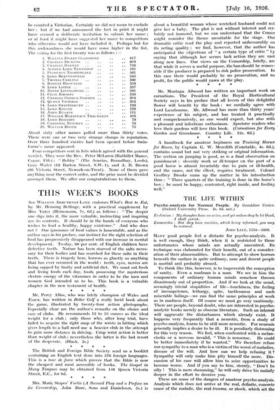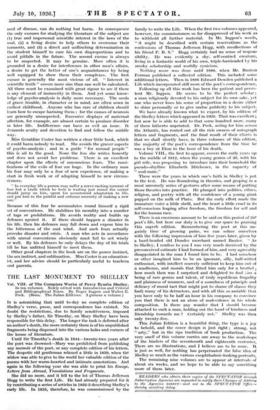THE LIFE WITHIN
Psycho-analysis for Normal People. By Geraldine Coster.
(Oxford University Press. 2s. 6d. net.). .
Endimion : My thoughts have no veins, and yet unless they be let blood, I shall perish.
Eumenides : • But they have vanities, which being reformed, you may be restored.
JoEN. LYLY, 1554-1606.
MANY good people feel a distaste for psycho-analysis. It is well enough, they think, when it is restricted to those
unfortunates whose minds are actually uncentred. Its technique was elaborated for their benefit, out of a consider- ation of their abnormalities. But to attempt to show horrors beneath the surface in quite ordinary, sane and decent people is morbid and probably absurd.
To think like this, however, is to impoverish the conception of sanity. Even a madman is a man. We see in him the components of ordinary human minds somehow thrown disastrously out of proportion. And if we look at the usual, seemingly trivial stupidities of life-touchiness, the feeling of incompetence, lethargy, spite, tactlessness and such miserable failings-we can find the same principles at work as in madness itself. Of course we must go very cautiously. There are people, beyond doubt, who are interested in psycho- analytic books merely as obscene literature. Such an interest will aggravate the disturbances which already exist. It happens very frequently that a neurotic, from a study of psycho-analysis, learns to be still more neurotic. For neurosis generally implies a desire to be ill. It is peculiarly distressing for this very reason. We feel, when confronted with a melan- cholia or a nervous invalid, "This is nonsense. He could be better immediately if he wanted." We therefore refuse our sympathy to a man who is a victim of the worst of maladies, disease of the will. And how can we help refusing it ? Sympathy will only make him pity himself the more. Dis- cussion of his case will allow him to seize opportunities to
become Worse. And if you say to him-, sternly, "Don't be silly ! This is mere shamming," he will only drive his malady deeper in the effort to deceive you.
These are some of the, dangers of amateur psycho-analysis. Analysis which does not arrive at the real, definite, concrete cause of the malady. the real trauma, or shock, which set the seed of disease, can do nothing but harm. In consequence the only excuses for studying the literature of the subject are (1) true and impersonal scientific interest in the laws of the soul, (2) a living desire to help others to overcome their torments, and (3) a direct and unflinching determination in the student himself to cure his own disproportions and to avoid pitfalls in the future. The second excuse is always to be suspected. It may be genuine. More often it is grounded in a desire for interference in other men's affairs, a desire to get the better of one's acquaintances by being well equipped to show them their complexes. The first excuse is generally the most vicious of all. "Interest in scientific truth" covers more sins than can well be calculated.
All three must be examined with great rigour to see if there is any element of insincerity in them. And yet some know- ledge of psycho-analysis is daily more necessary. The seeds of grave trouble, in character or in mind, are often sown in earliest childhood. Anyone who has care of children should learn how to escape harming them ; for the causes of neurosis are generally unsuspected. Excessive displays of maternal affection, for example, are almost certain to produce disorder in later life. Indifference can have as evil an issue. It demands acuity and devotion to find and follow the middle way.
Miss Geraldine Coster has written a clear little book, which it could harm nobody to read. She avoids the graver aspects of psycho-analysis ; and in a guide "for normal people" this is all to the good. None the less she writes honestly and does not avoid her problems. There is an excellent chapter upon the effects of unconscious fears. The rami- fications of the evils of fear are huge. In the ordinary man his fear may only be a fear of new experience, of making a start in fresh work or of adapting himself to new circum- stances.
"In everyday life a person may suffer a nerve-racking torment of fear lest a truth which he feels is waiting just round the corner should jump on him upset his accustomed adaptation to life, and put him to the painful and arduous necessity of making a new one.'
Because of this fear he accumulates round himself a rigid set of conventions. He stabilizes his morality into a number of tags or prohibitions. He avoids reality and builds up defences against it. If there should happen a disaster in his life, then his defences may fall down and expose him to the bitterness of the east wind. And such fears actually provoke disaster and crisis. A man who acts in accordance with unreal conventions obviously must fail to act wisely or well. By his defences he only delays the day of his trials till he has unfitted himself to meet them.
Other good chapters in the book are on the power instinct, the sex instinct, and sublimation. Miss Coster is an education- ist, and her advice should be particularly useful to teachers and parents.











































 Previous page
Previous page